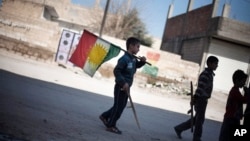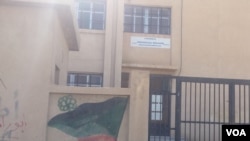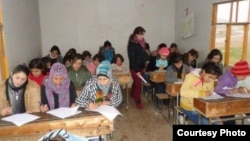Syria's civil war and the rise of Islamic State militants have left Syrian Kurds with an opportunity to control their areas in the north and northeastern part of that war-torn country. This has allowed the Kurds to exercise their once-banned ethnic culture freely.
The newfound freedoms in the Kurdish-controlled region are being used to promote Kurdish, a language that was banned for decades during the rule of President Bashar al-Assad and his late father, Hafez al-Assad.
With almost no presence of Syrian government forces, local Kurdish groups say they are free to learn their language and teach it to the new generation.
"It's a great thing that is happening now," said Ismael Omar, who teaches the Kurdish language through a private committee in the town of Amude.
"We just graduated 31 students," he told VOA. "We've been doing this since the start of the Syrian revolution."
Prior to the Syrian uprising in 2011, the entire education system in the Kurdish region was in Arabic only. Despite being successful at preserving the use of their language at home, Syrian Kurds had never had the chance to study it in schools.
Samira Hajji Ali, the head of the education commission at the local Kurdish administration in the city of Qamishli, said the time has come for the Kurdish to put their language into practice and pass it to their children.
"Our language was banned by the Baath [government] for decades. But now our children can get their education in their mother tongue," she told VOA.
She said that under the new governing body, Kurdish is the official language, along with Arabic and Syriac.
The local Kurdish administration that operates autonomously has set up a new curriculum that not only has Kurdish language courses, but also offers school textbooks that are different from what used to be taught in Syrian government schools.
"In the coming school year, we will have textbooks designed for elementary schools," said Abdulselam Mohamad, a teacher who works at a local public school in Qamishli. "All math and science textbooks are in Kurdish."
He told VOA that teachers are going through training sessions to be able to use Kurdish in the teaching process.
Critics urge gradual shift
Many residents, however, are critical of the new education system. They say that while it is good to teach in Kurdish and pass the language to children, the new curriculum imposed by the local government disregards the fact that students are not yet ready to receive education entirely in Kurdish.
"We're not against teaching our kids in Kurdish," said Nesrin Malla, a mother of three young children who go to a private school run by a Christian church.
"Kurdish is our mother tongue and we love it, but thrusting all those Kurdish textbooks on children at once is counterproductive," she told VOA.
Private schools, which still teach in Arabic, are not an option for all parents. Given the high tuition costs in private schools, residents have been left with no option but to send their children to public schools that teach in Kurdish.
Language experts voice a similar concern that imposing the language on students could disturb their learning experience.
"There has to be a gradual process in which Kurdish is introduced to students slowly," said instructor Omar. "You can't just teach them in a language that they have never been exposed to in their education, and then expect them to succeed academically."
Another hurdle facing students, experts say, is the differences between the Kurdish and Arabic alphabets. Belonging to the Indo-European language family, Kurdish uses the Latin alphabet in writing, while students have been used to the Arabic alphabet, which is written from right to left.
"This might seem like a minor issue," Omar said. "But it is actually problematic, given that students have to switch everything to the Latin script."
He said it will take a long time before students get comfortable with the new alphabet.
Recently, a new university was set up that offers undergraduate programs in four majors, including Kurdish literature, science, engineering and medicine.
Regardless of these technical difficulties, local Kurdish groups say that with the growing power they have acquired, they are determined to continue pushing for their language to be recognized in all aspects of life.






